- When firm went into administration cash was used towards repaying the bank's 31million loan
|

Anger: Thousands of Farepak Christmas hamper customers were cheated out of justice yesterday
Thousands of customers who lost money in the Farepak Christmas hamper firm scandal were cheated out of justice yesterday.
As a high-profile court case against the directors of the failed firm collapsed, it emerged that bankers had referred to customers' cash as 'Doris money'.
It was also revealed that bankers, HBOS, twice refused to protect 4million saved by customers, mainly on low incomes, to buy a hamper.
The Insolvency Service abandoned its five-year Farepak investigation after extraordinary new evidence showed that HBOS turned down the option of placing the money in a trust.
This meant that when the firm collapsed into administration in 2006 the cash was used towards repaying the bank's 31million loan rather than refunded to Farepak's vulnerable customers, many of them elderly.
More than 150,000 customers who had paid regular instalments for a Christmas hamper were left on average 400 out of pocket and offered just 15p in the pound.
Hugely embarrassing emails from senior bankers at HBOS, which is now owned by Lloyds Banking Group, showed they referred to the cash from Farepak's vulnerable customers as 'Doris money'.
The new evidence will heap further pressure on Peter Cummings, known as the banker to the stars of the financial world, who was handed a 'warning notice' and punitive fine by the Financial Services Authority in April as part of its investigation into HBOS.
It has been reported that Mr Cummings, who is challenging the FSA's rebuke, had been the 'ultimate arbiter' of what happened with Farepak.
This is the second collapse of a case brought by a government department this week – the Insolvency Service falls under the responsibility of the Department of Business.

Rich pickings: When the firm went into administration in 2006 the cash was used towards repaying the bank's 31million loan not vulnerable customers
On Monday the Serious Fraud Office dropped its investigation into property tycoon Vincent Tchenguiz.
On Farepak, lawyers representing the Insolvency Service had asked Mr Justice Peter Smith in the High Court to disqualify its former bosses from being company directors, accusing them of 'unfit conduct'.
The former bosses, including Sir Clive Thompson, an ex-president of the Confederation of British Industry, contested the disqualification applications.
But yesterday the government's companies watchdog abandoned its bid to penalise the directors after the new evidence emerged that included the fact that they had twice tried to protect the cash of customers.
Business Secretary Vince Cable said he felt 'huge' sympathy for 'those who lost out' and would reflect on the decision by the Insolvency Service.
A spokesman for Lloyds Banking Group said: 'As this matter is subject to ongoing legal proceedings, it would be inappropriate to comment.
'We have assisted the relevant authorities at all times during their investigation of European Home Retail plc and Farepak and the conduct of their directors.'
Stocks, Commodities Drop on China Manufacturing, U.S. - Bloomberg
Stocks dropped and commodities declined to the lowest level since November 2010 after the Federal Reserve cut growth estimates and a report showed China’s manufacturing may shrink for an eighth month. The euro weakened for the first time in three days.
The MSCI All-Country World Index (MXWD) fell 0.3 percent by 8:04 a.m. in London as the Stoxx Europe 600 (SXXP) Index lost 0.5 percent and Standard & Poor’s 500 Index futures dropped 0.5 percent. The S&P GSCI Index of 24 raw materials lost 1 percent, extending a 1.9 percent decline yesterday. Oil dropped as much as 1.7 percent to the lowest since October and copper slid 1.8 percent. The euro retreated against most of its 16 major peers. Japan’s Topix Index added 0.9 percent.
China’s manufacturing may shrink in June, matching the streak of contractions during the global financial crisis, according to a preliminary reading of a purchasing managers’ index by HSBC Holdings Plc and Markit Economics. Fed officials cut their estimate for economic growth in 2012 to between 1.9 percent and 2.4 percent, and extended stimulus known as Operation Twist. Spain will auction bonds and a preliminary report may show European services and manufacturing contracted at the fastest pace in three years.
“Even though markets are cheap, we’re not back to a risk- on mode,” said Andrew Pease, Sydney-based chief investment strategist at Russell Investment Group, which manages about $150 billion. “Risks in Europe are not over by a long way.”
The 17-nation euro slid 0.3 percent to $1.2668 from yesterday, when it capped a two-day advance of 1 percent. It fell 0.2 percent to 100.90 yen, after gaining 1.6 percent over the previous two days. Greece’s stock market was put under review for reclassification to emerging markets by MSCI Inc. (MSCI), a change that would make the nation the first advanced country to be cut to developing status.
Growth Downgrade
Oil tumbled as low as $80.11 a barrel in New York before trading at $80.32. Copper fell to $7,413 a metric ton as nickel dropped 2 percent to $16,850 a ton. Cash gold lost 0.5 percent to $1,600.18 an ounce.
U.S. policy makers cut their estimate for growth from their April forecast of 2.4 percent to 2.9 percent. The unemployment rate will end the year at 8 percent to 8.2 percent, up from 7.8 percent to 8 percent in April.
The Federal Reserve will prolong Operation Twist through the end of the year, selling $267 billion of shorter-term securities and buying the same amount of longer-term debt in a bid to cut borrowing costs and spur the economy.
China’s Shanghai Composite Index (SHCOMP) dropped as much as 1.7 percent to the lowest in almost three months. Concerns that a growth slowdown is deepening and Greece will leave the euro area have pushed the Shanghai index down more than 8 percent from this year’s high set on March 2.
Japanese Stocks
The MSCI Asia Pacific Index fell 0.6 percent, retreating from a one-month high after rising 0.2 percent earlier. South Korea’s Kospi index dropped 0.8 percent, Australia’s S&P/ASX 200 Index fell 1.1 percent and Hong Kong’s Hang Seng Index slid 1 percent.
Samsung Electronics Co. (005930), the world’s biggest mobile-phone maker by sales that counts China and the U.S. as its biggest markets, fell 2 percent in Seoul.
Japan’s Nikkei 225 Stock Average gained 0.8 percent as the Fed’s decision to lengthen the maturity of its assets, as opposed to buying more, was seen curtailing the yen’s advance, boosting the outlook for exporters. Stocks also gained as the country’s upper house confirmed two new members for the Bank of Japan (8301)’s board who signaled support for monetary stimulus.
Canon Inc. (7751), a camera maker that gets 27 percent of its revenue in the Americas, rose 1.4 percent. Renesas Electronics (6723) Corp. gained 3.1 percent on a report KKR & Co. and Silver Lake are in talks to invest in the chipmaker.
Europe Manufacturing
A composite index based on an initial survey of purchasing managers in the services and manufacturing industries across euro nations probably dropped to 45.5 in June from 46 in May, according to the median forecast of economists in a Bloomberg survey before data today. The reading would be the fifth in a row below the 50 level separating contraction from expansion, and would be the lowest since June 2009.
Spain is scheduled to auction bonds today maturing 2014, 2015 and 2017. The nation held its first debt auction earlier this week since becoming the fourth euro member to seek a bailout earlier this month. Spain sold 12-month bills at an average yield of 5.074 percent, the most on record going back to 2004, data compiled by Bloomberg showed.
Treasuries rose, sending 10-year yields down for the first time in three days. Ten-year yields fell three basis points to 1.63 percent after gaining eight basis points in the two days.
The cost of insuring Australian corporate bonds from default declined, according to traders of credit-default swaps. The Markit iTraxx Australia index fell 1 basis point to 181 basis points as of 10:47 a.m. in Sydney, according to Westpac Banking Corp. (WBC) The gauge is set for its lowest close since May 11, according to data provider CMA.
Oil’s decline accelerated as U.S. crude inventories increased 2.86 million barrels last week to 387.3 million, the highest level since July 1990, an Energy Department report showed. Supplies were forecast to shrink 1.3 million barrels, according to a Bloomberg News survey of analysts.
To contact Bloomberg News staff for this story: Chua Baizhen in Beijing at bchua14@bloomberg.net
To contact the editor responsible for this story: James Poole at jpoole4@bloomberg.net




If you have any sense and don't want to loose your savings you know what's coming move them now before its to late
- DonalM, Leeds, 21/6/2012 08:29
Report abuse